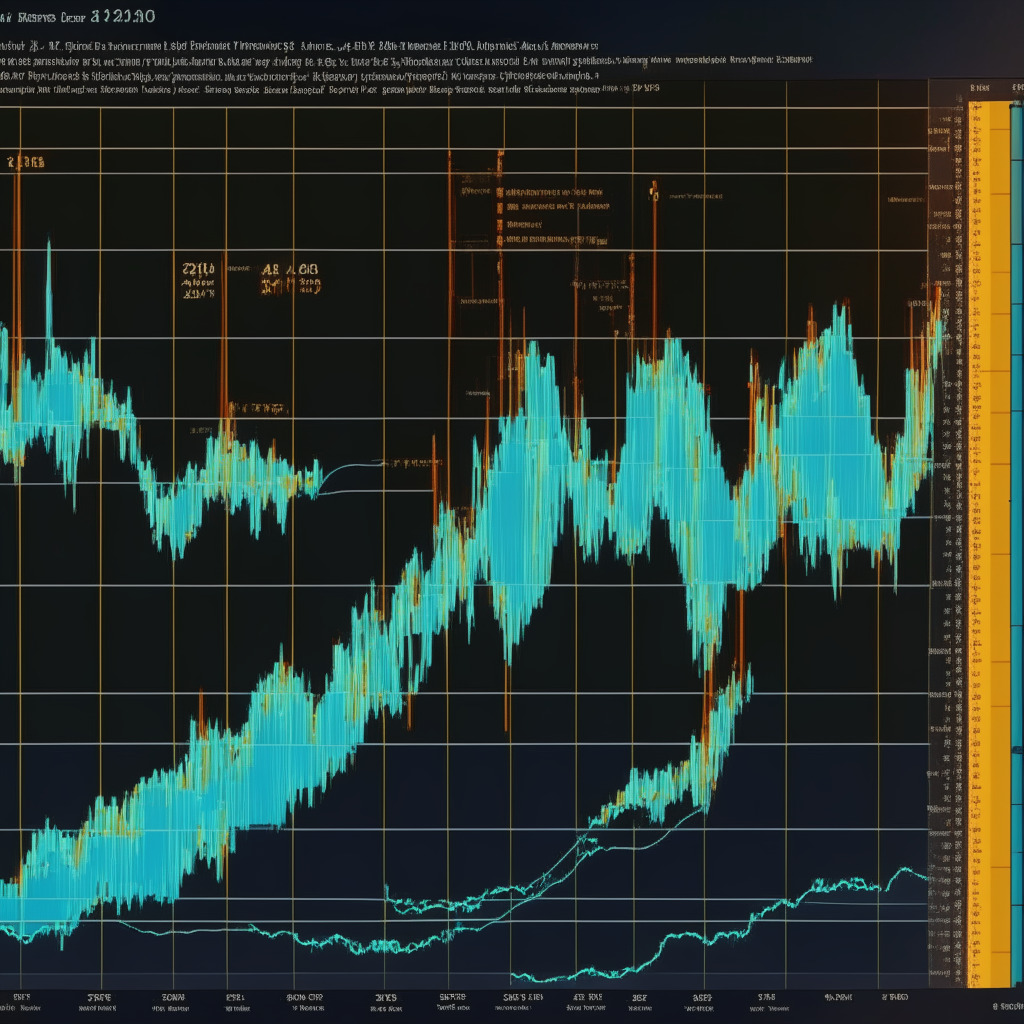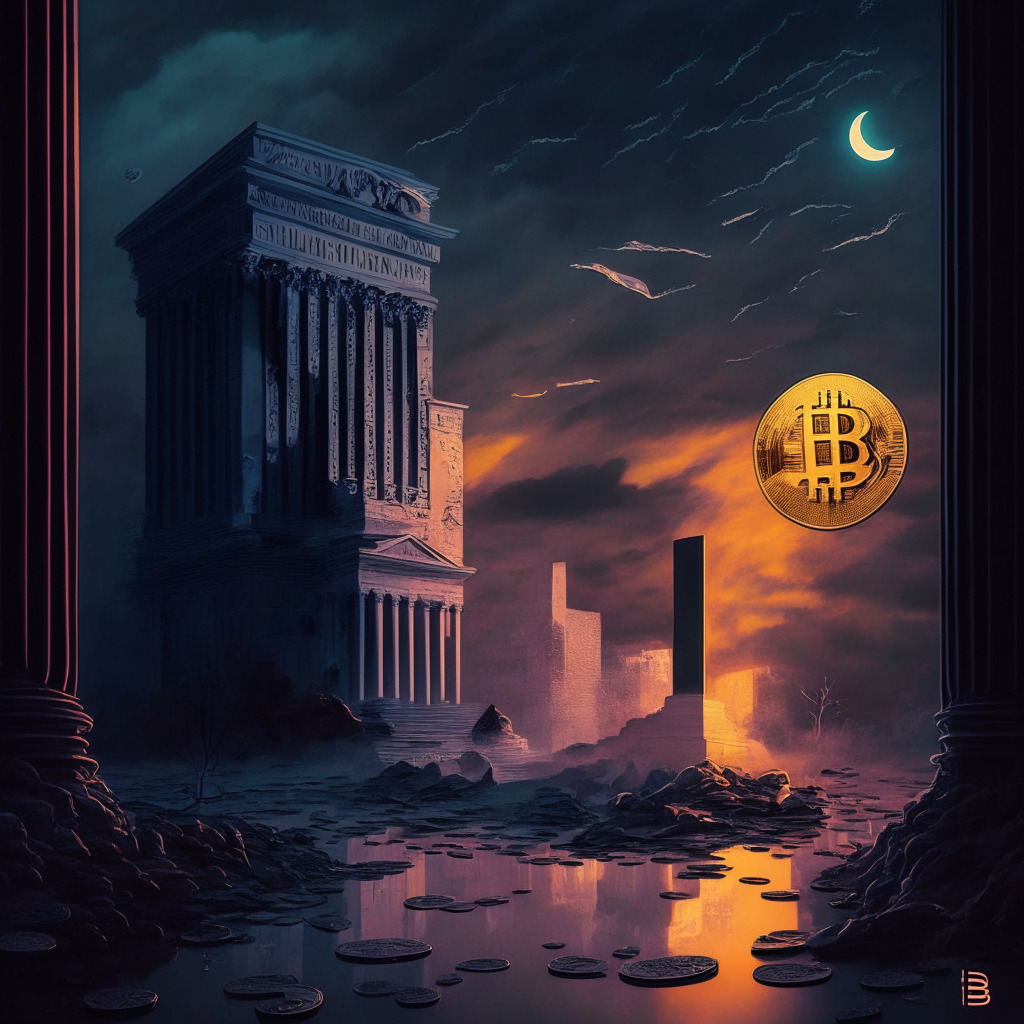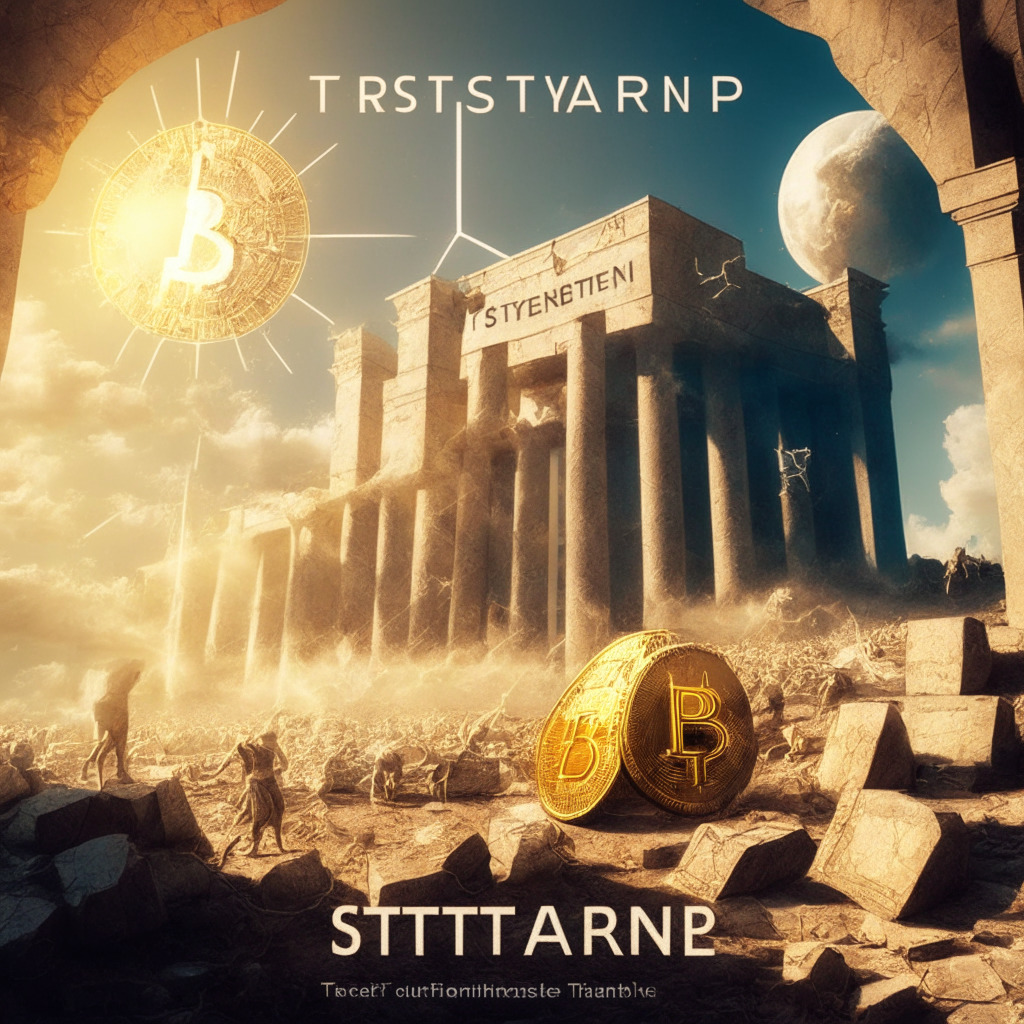Bitcoin’s price gains momentum as market participants anticipate positive outcomes from the US Non-Farm Payroll data release and its impact on the US dollar. Growing demand in cryptocurrency mining and CFTC’s reassessment of risk management regulations create a bullish momentum for Bitcoin.
Search Results for: RSI
Crypto and Stocks Rally: US Debt Ceiling Deal and Fed’s Potential Rate Hike Skip Impact
The U.S. Senate’s passage of the Biden-McCarthy debt ceiling deal led to a recovery in crypto and stock markets, with Bitcoin and Ethereum prices rallying. However, low “institutional excitement” and volatile market conditions persist, highlighting the need for thorough research before investing.
Bitcoin Stagnates vs BRC-20 Tokens Surge: U.S. Treasury Replenishment’s Impact on Crypto
The crypto market is in an accumulation phase, with Bitcoin below $27K and BRC-20 tokens nearing a $500 million market cap. The U.S. Treasury replenishment process and the future of BRC-20 tokens play significant roles in market development. Investors anticipate Ether’s growth and Litecoin’s halving event.
Colombia’s Crypto Boom: Financial Inclusion Meets Regulatory Challenges
Colombia has witnessed a surge in crypto adoption, with Bitso trading platform experiencing a tenfold increase in retail clients since last year. The country’s potential for mainstream crypto adoption offers opportunities for broader financial inclusion and effective tax collection measures. However, clear regulations and policies are crucial to ensure investor protection and long-term viability of the crypto ecosystem within Colombia.
CFTC’s Risk Management Revamp: Balancing Crypto Security and Innovation
The CFTC is considering a revamp of risk management rules in response to emerging technologies like digital assets and their associated risks. Commissioner Christy Goldsmith Romero emphasizes the need for updated regulations, striking a balance between protecting investors and fostering industry growth while dealing with cryptocurrency adoption.
Crypto Market Dip: Analyzing Volatility, Growth Factors, and the Builder’s Market Era
Crypto markets dipped in June, with Bitcoin experiencing a 0.5% decrease. However, Ether and Litecoin demonstrated growth, highlighting market diversity. Experts suggest we’re in a “builder’s market,” setting foundations for the next bull cycle. Investors should stay informed on global events shaping the industry.
Quantum Computing: Revolutionizing Blockchain Consensus and Reducing Environmental Impact
Researchers from universities in Australia and the US have proposed a novel proof-of-work (PoW) scheme for blockchain consensus using quantum computing. This PoW system has the potential to offer significant speedup and energy savings compared to classical hardware systems, enhancing blockchain applications’ efficiency and reducing environmental impacts.
Navigating EU’s MiCA Policy Gaps: Token Classification, Staking, and NFTs in Crypto Regulation
Experts raise concerns about gaps in the European Union’s Markets in Crypto Assets (MiCA) policy package, specifically in token classification, staking, and NFTs. The study suggests considering the US’s Howey Test for token classification and highlights the need for clarity on granting interest and investors’ profit expectations.
Synthetix v1 to v2 Perpetuals Migration: Innovation Meets Concern
The Synthetix community recently approved a plan to help users move funds from the closing v1 perpetuals market to the upgraded v2, showcasing the platform’s commitment to continuous improvement. This transition, aiming to be least disruptive, has positively impacted the value of SNX and the total value locked in Synthetix.
Sui Network and Red Bull Racing Team: The Future of Blockchain in Motorsports
Sui Network backed by Mysten Labs, recently announced a partnership with Red Bull Formula One Racing Team as their official blockchain partner. This collaboration aims to demonstrate web3’s potential in connecting audiences and enhancing fan experiences, while navigating the ever-changing landscape of crypto-related partnerships within the sports industry.
Binance Delists Privacy Coins in EU Countries: Balancing Anonymity and Regulation
Binance plans to delist privacy coins like Zcash, Monero, and Dash for users in Spain, France, Italy, and Poland starting June 26, 2023, due to local regulations. The move highlights the delicate balance between ensuring individual privacy and complying with regulatory frameworks in the crypto market.
Exploring MakerDAO’s $1.28B Bet on Real-World Assets: Boosting Yield or Risky Undertaking?
MakerDAO’s community voted to open the BlockTower Andromeda vault, aiming to invest up to $1.28 billion in short-dated U.S. Treasury bonds using overcollateralized DAI stablecoin. This reflects efforts to diversify reserve assets, generate higher yields, and integrate crypto with traditional financial markets.
BLOK ETF Surge in Bitcoin Mining: Potential Rewards vs. Environmental Concerns
Amplify Investments’ blockchain ETF, BLOK, has increased its allocation to Bitcoin mining companies from less than 10% to 21%. Amidst concerns about market transparency, regulation, and environmental impact, this move reflects optimism in the oversold market and highlights the potential rewards of investing in the mining sector.
Consensus 2023 Reflection: ICO Mania’s Mixed Legacy – Successful Projects and Scams Debated
At Consensus 2023, CoinDesk panelists reflected on the “ICO mania” period (2017-2018), highlighting both its opportunities and challenges. Initial Coin Offerings (ICOs) brought significant decentralized finance projects like Aave and 0x but also faced issues of investment fraud and securities violations, with 80% of ICOs found to be scams.
Exploring the Potential of Real World Assets: Pros, Cons, and Blockchain Integration Impact
Real World Assets (RWA) represent assets outside the blockchain, such as real estate or loans, offering stability and programmability. As interest in RWA-backed investments grows, blockchain token prices like Ethereum and Polygon could rise, potentially transforming the financial landscape.
Deutsche Telekom Embraces Blockchain by Supporting Polygon: Analyzing the Partnership
Deutsche Telekom enters blockchain sector by supporting Polygon infrastructure as a validator, aiming to boost security and decentralization. The partnership is expected to unlock ownership and autonomy, making Web3 technology more accessible and encouraging businesses to embrace blockchain via Polygon.
Nike NFTs Enter EA Sports Games: Exploring Benefits, Pitfalls, and Main Conflicts
Nike’s NFT marketplace, .Swoosh, will be incorporated into future EA Sports games, following the release of Nike’s first NFT collection, Our Force 1. This partnership brings NFTs into mainstream gaming, offering potential for immersive experiences and unique collectibles while raising concerns about environmental impact and diverting focus from gameplay.
Disrupting Freelancing: DeeLance’s Blockchain Metaverse vs Traditional Platforms
DeeLance, a decentralized web3 freelancing and remote work platform, disrupts the recruitment sector by offering a blockchain-centered, secure environment. Addressing issues like exorbitant fees and payment fraud via tokenized NFTs, it has raised over $1.2 million in its $DLANCE crypto token presale. However, challenges like compatibility with existing systems and cryptocurrency volatility remain.
USDC’s Move to Arbitrum: Boosting Speed and Reviving Stablecoin’s Future
Circle plans to launch a new native version of USDC on the Arbitrum network, aiming to enhance transaction speed using cross-chain transfer protocols. Amid a changing landscape for stablecoins, this move could help regain market share and adapt to the evolving world of blockchain and cryptocurrencies.
Nike’s Partnership with EA Sports: Exploring the Impact on NFTs, Gaming, and Digital Fashion
Nike and EA Sports have partnered to integrate Nike’s digital creations from its .SWOOSH platform into EA Sports gaming titles, aiming to provide immersive experiences and high-level customization. This collaboration follows Nike’s recent venture into non-fungible tokens (NFTs) with its sneaker collection.
Fantom Ecosystem’s Unease Amid Multichain Crisis: Impact, Solutions, and Prospects
DeFi protocols on the Fantom ecosystem are taking precautionary steps due to Multichain’s mounting bridge crisis and absent CEO. Almost 40% of cryptocurrencies on Fantom arrived through Multichain’s bridges, highlighting the importance of stabilizing this infrastructure to prevent potential decrease in value or isolation of wrapped assets.
Circle’s USDC Expansion: Revolutionizing Layer 2 Ecosystem or Spreading Resources Thin?
Crypto giant Circle is launching its USDC stablecoin on the Arbitrum Layer 2 network, bringing benefits such as eliminating bridge withdrawal delays and enabling upgradeable smart contracts. This introduction aims to revolutionize the Layer 2 ecosystem by improving liquidity and enabling quicker cross-chain transfers. Native USDC launch is scheduled for June 8.
Sui Network and Oracle Red Bull Racing: Unleashing Blockchain’s Potential in Sports
Layer-1 blockchain protocol Sui Network announces partnership with Oracle Red Bull Racing to create immersive digital experiences for fans. The collaboration aims to exhibit the potential of blockchain technology in developing productive human interactions within the sports industry.
Title: Blockchain’s Impact on Arts, Culture and Media: Bridging the Divide and Empowering Creativity
Blockchain technology is transforming the art world, addressing artist royalties and enabling underappreciated art forms to gain recognition. Artificial intelligence plays a significant role in this shift, with the blending of arts, culture, and media into the blockchain universe continually evolving.
AI-Generated Speech in Parliament: Embracing Innovation or Risking Legislative Integrity?
Italian Senator Marco Lombardo used a GPT-4 chatbot-generated speech to spark debate on AI’s implications and potential in policy-making. As governments explore regulatory measures for AI systems, balancing AI benefits with ethical, moral, and safety concerns is crucial, urging responsible implementation and critical evaluation of its consequences.
Public Bounties in DeFi Hacks: Effective Deterrent or Encouragement for Hackers?
Jimbos Protocol offers a public bounty of $800,000 after a hacker exploited the DeFi platform, stealing around $7.5 million worth of Ether. The move raises questions on whether offering bounties encourages future attacks or is a necessary measure to recover lost funds and protect users.
XRP’s Bullish Outlook Amid Ripple-SEC Case: Pros, Cons, and the Rise of Meme Tokens
XRP’s value of $0.506955 exhibits a 12.5% gain over the past week, fueled by positive sentiment regarding the Ripple-SEC case. Strong support levels and acquisitions like Metaco and a CBDC platform reflect Ripple’s confidence. However, outcome uncertainty leads investors to consider promising altcoins, such as Wall Street Memes (WSM) with its $2.2 million presale and growing community.
The Great Debate: Treating Crypto Assets as Securities by Default in the EU
A study commissioned by the European Parliament suggests treating crypto assets as securities by default, applying stringent EU governance and authorization rules. The report highlights regulatory challenges in the complex, cross-border crypto industry and raises questions about addressing decentralized finance, staking, and non-fungible tokens within the upcoming Markets in Crypto Assets (MiCA) regulation.
Coinbase Ventures’ DeFi Dilemma: Balancing Multi-Chain Innovation with Regulation and Security
Coinbase Ventures has made significant investments in the DeFi space, supporting projects such as ZK Link, Dolomite, Hourglass, and PYOR. However, challenges like ensuring safety, regulation, and balancing innovation persist, causing uncertainty for the future of multi-chain trading and DeFi adoption.
Boost Your Productivity: How Chrome Extensions and ChatGPT Revolutionize Browsing
Chrome extensions enhance user experience by streamlining processes, increasing productivity, and offering a personalized browsing experience. By integrating these extensions with ChatGPT, users can access valuable features such as content summarization, language support, and contextual information effortlessly.
Exploring the Impact of OX Token on OPNX Platform: Boost or Bust?
OPNX recently unveiled its governance token, the Open Exchange Token (OX), aimed at reducing trading fees, causing a 16% increase in FLEX value. OX is an ERC-20 token with a capped supply of 9.86 billion, appealing to investors seeking reduced fees for substantial trading volumes. Skeptics question its long-term stability amidst renewed interest following its launch.
Tether’s Record Market Cap: Resilience, Transparency, and Crypto Mining Ventures
Tether’s market cap reaches a new high of $83.2 billion, recovering from a $20 billion loss last year. Its resilience, industry-leading transparency, and recent ventures into crypto mining and sustainable practices contribute to its regained trust and success in the cryptocurrency landscape.































